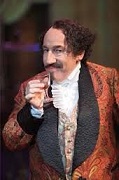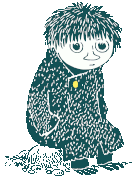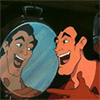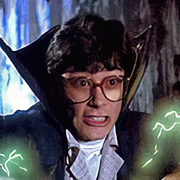|
How does one become a well-connected Manhattanite?
|
|
|
|

|
| # ? Apr 19, 2024 11:04 |
|
Thanks everyone for continued suggestions! Lots of good stuff, and all appreciated.UnoriginalMind posted:I think an excerpt from JR by Gaddis would be a nice way to bring people to bear on Postmodernism. Maybe just showing off a few pages and how he slips between characters and settings. I was not able to finish it, but it's style is a fantastic thing to experience, however difficult to endure. Mr. Squishy posted:Why not Carpenter's Gothic, for brevity. Also, you get the benefit of showing how Gaddis hides his plot which wouldn't come across with an extract. Hell, even shorter go for Agapé Agape, since Bernhard's ruled out for not being anglophone. Gaddis is definitely on the shortlist, and I"m trying to figure out whether to do excerpts alongside others, or throw them one of the short novels. Agapé Agape didn't do much for me when I read it on release, but maybe it will once I revisit it now I'm getting older. At some point I'll drop The Recognitions and JR on a grad class and see what we can all make of it. Bhaal posted:I think a lot of good options have been covered, but just to throw out a suggestion that springs to mind and hasn't been mentioned: Absolutely will have some McCarthy on there, though maybe Blood Meridian? Whatever I do of his forces confrontations with genre, historical and ongoing violence, etc, plus there's his own infuriatingly terse and contradictory statements about his own work to deal with. taco show posted:Gertrude Stein! Yes, Stein for days (two of them, in fact), and I'd still lean Sound and Fury. Albee's a great call; nothing about Who's Afraid of Virginia Woolf is difficult to parse, but the whole experience is as draining as anything you could hope for or dread. Some of the other dramatists I want in there are the likes of Caryl Churchill, maybe "The Skriker," and I'm sure I'll break my own Anglophone thing to put in some Artaud or Brecht. cats on the beat posted:I have no idea what I would assign for your class, but to respond to the rest of your questions I would hope to read books that are not often encountered by Western audiences. This may mean they are books in translation or books that present ideas and themes that are written for non-Western audiences. It would be interesting to read these kinds of books and pick apart the question of "difficult" literature - does the language or writing style make these books "difficult?" Does the sense of foreign or Other identities make the book difficult to understand? You could talk about the difficulty of translation or book economies that make encountering books by non-Western authors difficult, and why that may be a problem. Thanks! All interesting, for sure, and I would love to do a version of the class that's all literature in translation; however since I'm hired for this year anyway to do English-language lit, I'll stick mostly to that. Calvino's possible because of the lightness and shortness of his prose, both of which will probably be pretty necessary a couple months in. Might do instead "If on a winter's night a traveler" or Castle of Crossed Destinies though. odincode posted:"Pale Fire" by Nabokov for structure Probably won't do this only because I teach it in almost everything else, and I read it constantly, and live and breathe it. Lolita's difficult too, of course, but maybe too often read and too specifically focused? I would love to teach Ada, or Ardor, since that's a super weird and difficult book, but too long for this class and there's just no way to excerpt it productively. Burning Rain posted:make them read robert shields' diary in its entirety, then fail them if they don't remember all the entries. The diary is fascinating! Will keep in mind if I do life writing at any point. Not much of one for sadistic assignments on top of sadistic reading though. Thanks for reminder on BS Johnson, The Unfortunates is definitely a candidate. I also thought about putting one of Lynd Ward's wordless wordcut novels on there—I'm not averse to adding out and out comics, either, but might wait on that for an actual comics course. Never gotten around to reading that Seth, will take a look at it. Mange Mite posted:Henry Darger oh god
|
|
|
|
By the way, anyone who clicked on this thread would probably be interested in Larry McCaffrey's list of the best hundred English-language books of fiction of the 1900s. There's a lot to argue with there, obviously, and like any such list you could nitpick it for days but I like his list more than just about any other because it rewards experimentation, it doesn't discount genre (but it also doesn't praise it to the moon), it's open to collections of stories as coherent fictional statements, it doesn't elevate misery for the sake of misery (though it may overrate depictions of evil), etc. etc. Plus the only way you'll have read all hundred already is if you're McCaffrey himself. I've slowly been working my way through it for years now, not in any particular order. Will be doing so for years more yet. elentar fucked around with this message at 09:22 on May 20, 2015 |
|
|
|
It took me quite a while to read any one of these though I guess I am not in a class for people specialized in literary analysis.. I just want to make sure that there isn't too much for them to read and comprehend - by definition these are books that should be read through carefully and slowly and you risk losing that if you do too much. The Sound and the Fury or Absalom, Absalom! are the hardest Faulkner, I'd say, with the Sound and the Fury being the better book, IMO. Blood Meridian is probably the right McCarthy book if you do go with him. DFW has a ton of short stories though I can't think of one that is particularly difficult to read through. There's obviously passages from Dubliners which are short and difficult - something like The Dead though you'd really get groans with excerpts from Finnegan's Wake.. Something like the Crying of Lot 49 is a shorter book that is pretty dense. To the Lighthouse is another short book with a lot to it. Gaddis is good but the novels will take up a huge chunk of time/discussion.
|
|
|
|
Invicta{HOG}, M.D. posted:DFW has a ton of short stories though I can't think of one that is particularly difficult to read through. The titular story in Oblivion is a dream of a dream of a dream of a dream, which is always a bit fun to trace out, and Mister Squishy from the same collection is a similarly nested tale told exclusively in market research jargon. Dennis Potter's Ticket to Ride might also be worth a look. Uncanny doppelgangers but as a product of a stroke or something, and he really could write.
|
|
|
|
Invicta{HOG}, M.D. posted:...you'd really get groans with excerpts from Finnegan's Wake.... Oddly enough, I've only ever had good experiences bringing in excerpts from the Wake; the key for me has been to get them reading out loud to each other, usually in groups to start then joining all together, using no more than a page or so at a time. Once they realize that, yes, they actually do have to come to grips with what's in front of them, they usually start picking apart the portmanteau words, and end up with really interesting thoughts about language and about the conventions of the novel. But then, the Wake is one of my things, so it could just be that. Still, I learn new things every time from them. Mr. Squishy posted:The titular story in Oblivion is a dream of a dream of a dream of a dream, which is always a bit fun to trace out, and Mister Squishy from the same collection is a similarly nested tale told exclusively in market research jargon. I might do bits of The Pale King, which lends itself quite well to excerpting, and lets me talk about "anhedonia" and other fancy ways of making boredom fascinating—plus there's the difficulty of the work's incompletion, and how far to trust the people charged with bringing such works to press. If I do it I'll probably also do Kafka's Castle or Trial earlier in the semester. Will check out the Potter, thanks!
|
|
|
|
Arglebargle III posted:How does one become a well-connected Manhattanite? Well, writing a lovely novel is a good first step. 
|
|
|
|
I'll second Gertrude Stein, in particular Tender Buttons. Honestly, I don't know if I'd really describe it as difficult, per se. I think it just takes an open mind more than skill or intelligence. Although I suppose intelligence helps with the open mind part.
|
|
|
|
elentar posted:Absolutely will have some McCarthy on there, though maybe Blood Meridian? Whatever I do of his forces confrontations with genre, historical and ongoing violence, etc, plus there's his own infuriatingly terse and contradictory statements about his own work to deal with. Bhaal fucked around with this message at 00:31 on May 21, 2015 |
|
|
|
Mr. Squishy posted:Why not Carpenter's Gothic, for brevity. Also, you get the benefit of showing how Gaddis hides his plot which wouldn't come across with an extract. Hell, even shorter go for Agapé Agape, since Bernhard's ruled out for not being anglophone. I wasn't thinking of how many books he intended to go through, but that's a good point. CG is a good story and would certainly provide a lot to discuss.
|
|
|
|
An excerpt from the Silmarillion by Tolkien may work for this. There are several self contained stories like Hurin and Turin which aren't too long. The difficulty comes from Tolkien using these tales more to flesh out his world rather than to develop themes or tell a story. They could help you show how authors develop complex worlds around their characters.
|
|
|
|
Slaan posted:An excerpt from the Silmarillion by Tolkien may work for this. There are several self contained stories like Hurin and Turin which aren't too long. The difficulty comes from Tolkien using these tales more to flesh out his world rather than to develop themes or tell a story. They could help you show how authors develop complex worlds around their characters. You could also use some extracts from books by Dr Seuss, the difficulty comes from the use of rhyme, which can be challenging if you haven't encountered it before.
|
|
|
|
Slaan posted:An excerpt from the Silmarillion by Tolkien may work for this. There are several self contained stories like Hurin and Turin which aren't too long. The difficulty comes from Tolkien using these tales more to flesh out his world rather than to develop themes or tell a story. They could help you show how authors develop complex worlds around their characters. May be taking this more seriously than it deserves, but: I have a lot of time for Tolkien, and especially the Silmarillion, which I think demonstrates both his virtues and flaws very well. It's the sort of work that, were it found in fragments, would be considered a mythic masterpiece—but as with all his work, the impulse to exhaustive completion takes over, and spoils a lot of the best parts by bogging them down in overly meticulous detail. I'd probably teach some in any course on fantasy literature, but not in this one, there's way better and stranger works for showing the workings of complex, fantastic world-creation that add a lot of other stuff to the mix as well. For instance, Amos Tutuola's My Life in the Bush of Ghosts, or sections of Ursula Le Guin's Always Coming Home, or Russell Hoban's Riddley Walker, or Flann O'Brien's The Third Policeman, or Leslie Marmo Silko's Ceremony etc., etc. A human heart posted:You could also use some extracts from books by Dr Seuss, the difficulty comes from the use of rhyme, which can be challenging if you haven't encountered it before. Heh. Hell, maybe I'll give them some Seuss to read alongside Edith Sitwell and Gertrude Stein.
|
|
|
|
Now that you mention it, The Third Policeman would be a great choice for this syllabus. It's short-ish and thwarts a college-level reader's expectations at every turn. Did anybody suggest The Dictionary of the Khazars yet?
|
|
|
|
|
Arglebargle III posted:How does one become a well-connected Manhattanite? It's often a hereditary condition. You can get by with educational pedigree too, usually through an influential mentor (though usually they are all indistinguishable in terms of race and class) OXBALLS DOT COM fucked around with this message at 14:38 on May 26, 2015 |
|
|
|
I've seen you mentioned Danielewski - and in fact I think his "Only Revolutions" qualifies without a doubt. The book is alien; a triumph of form over content and, at least for me, not really a book you can read. His other works - love them, and wouldn't really think of them as "difficult", but this one... I'd mention "Tree of Codes" by Jonathan Safran Foer - again, not exactly a book, not exactly a gimmick, and again - don't really know if it's readable. Similarly "A Hundred Thousand Billion Poems" by Raymond Queneau. "Alphabetical Africa" by Walter Abish comes to mind as well, not only from the point of the reader, but also from the point of the writer; "Lion-Eating Poet in the Stone Den" in terms of pronunciation. Looking at it - most of constrained writing literature, I think would apply.
|
|
|
|
A human heart posted:You could also use some extracts from books by Dr Seuss, the difficulty comes from the use of rhyme, which can be challenging if you haven't encountered it before. I see you've never tried to teach rhyme to ESL students
|
|
|
|
elentar posted:May be taking this more seriously than it deserves, but: I have a lot of time for Tolkien, and especially the Silmarillion, which I think demonstrates both his virtues and flaws very well. It's the sort of work that, were it found in fragments, would be considered a mythic masterpiece—but as with all his work, the impulse to exhaustive completion takes over, and spoils a lot of the best parts by bogging them down in overly meticulous detail. Thank you for so clearly explaining the exact thing I hate about Tolkien, I've been trying to phrase it well for some time, and this is pretty much exactly what I want to say. For me, Tolkien's work is difficult because, at some stage of reading it, the tiny voice in my head goes, "Why the gently caress are you reading this? Life is too short to give a gently caress about the genealogy of hobbits!" EDIT: More on subject, I haven't read enough Faulkner to have a decent opinion on what you should include, but I would definitely include some of his work. It's pretty much exactly what springs to my mind when I think of "difficult but rewarding literature."
|
|
|
|
Calling a class "difficult literature" sounds kind of silly. The best lit classes are always those where the teacher has identified what it is they care about and chooses books they themselves actually like, with a blatant bias towards some form or ideology or other.
|
|
|
|
House Louse posted:I see you've never tried to teach rhyme to ESL students This is an interesting comment. Is it difficult to hear rhymes in languages you don't speak very well? I've never had any trouble with French, but that's not very different to English, as these things go.
|
|
|
|
Dzhay posted:This is an interesting comment. Is it difficult to hear rhymes in languages you don't speak very well? I've never had any trouble with French, but that's not very different to English, as these things go. The problem isn't really with hearing the rhyme. Children (and adults for that matter) can pick out sounds that rhyme pretty easily when they hear it. But for a learner, English spelling can be a complete nightmare sometimes. Even as an adult, I still come across a whole bunch of English words I have no idea how to pronounce properly unless I look it up or read it in an obvious context such as in a poem with a clear rhyming pattern (ABAB, BAAB, or whatever).
|
|
|
|
If you're basing your pronunciation off poems you must have a few weird takes. Haven't you heard of poetic license?
|
|
|
|
It was just an example.
|
|
|
|
Dzhay posted:This is an interesting comment. Is it difficult to hear rhymes in languages you don't speak very well? I've never had any trouble with French, but that's not very different to English, as these things go. It's difficult to hear anything in any language if you don't give a poo poo. The practical problems are a) they find English hard enough as it is without doing crazy poo poo like using their imaginations and having fun (or reading subtext; it's so hard to get the surface meaning that they can't hold onto it long enough for subtext to add up), and b) their vocabulary and general familiarity with English are weak compared to native speakers so they have hard times thinking up rhymes even if they know what they are. I don't know what Ulvir's talking about. Mind you I've only taught native Chinese and Zulu speakers, maybe it's easier in languages closer to English.
|
|
|
|
Shibawanko posted:Calling a class "difficult literature" sounds kind of silly. Strangely, I have identified what it is I care about and chosen books I actually like, though whatever blatant bias I have (or show consistently in the classroom) is for an open pedagogy: I want students to be aware of and participate in the construction of the class. So I had 2/3 or so of the syllabus already written when I made this thread, but I wanted to know what sorts of things I was overlooking, so I could adjust the pre-constructed portion as needed and have candidates to fill out the other 1/3 with. Also, even more directly, one of the assignments will be for them to bring in and present their own difficult literary texts—so by polling the room here, I'm hoping to get a notion of what might or might not turn up in an open forum, so that I can nudge response along accordingly. Less directly, this school has a really heavy creative arts component, so until I get in the class with them, I won't know whether I have a roomful of poets, or dramatists, or fiction writers, or something in between. I have to be able to give a cross-section of what "difficulty" means, while also adjusting so the plurality of works are ones they're most strongly engaged with. As to the class name, it isn't simply just "Difficult Literature" because of all the required prefixes and flags for enrollment. But that is in the title, because I want students who know what they're getting into, and are excited about or at least prepared for it.
|
|
|
|
Excerpts from Gilgamesh, The Tempest, selection from Arthur legend, T.S. Eliot. Then Harry Potter fanfic until they all drop the class.
|
|
|
|
That sounds like a load of fun.
|
|
|
|
Out of curiosity - what did you, in the end, include in the syllabus?
|
|
|
|
ANd how many students applied?
|
|
|
|
Also your name, address and social security number.
|
|
|
|
|
anilEhilated posted:Also your name, address and social security number. Heh. Well, in the end, the class ended up getting moved to the spring, because they had to shuffle assignments around for various reasons. So I've got a little while longer to tinker with it, and I'm playing around with various cross-sections of the shortlist below. (If you posted something and it's not on the list, I probably thought about it and left it off, but I may have just forgotten or deleted accidentally. I'll come back around to it in either case though.) Caveats: obviously, it's like four classes' worth of material. It skews toward prose, especially the later we get; that's mostly what I'll be paring away to get to the final list. There's a lot I'm not happy with: it's too white, for a start, and mostly too straight. It's also oddly light on '70s and '90s stuff. If I get to teach the class again, I'll probably swap out all except a couple of the works. * = excerpts
edit: oh, and also: I don't have time to formally cover film or visual art or music or anything else, but I want to sort of gesture in that direction at least to set the mood for some of the classes, so I'll probably play some things like Stravinsky's Rite of Spring, or a track from Trout Mask Replica or things like that, and put some slides up for stuff that goes along with recognizable literary moments like cubism, surrealism, abstract expressionism, art brut etc. elentar fucked around with this message at 06:17 on Jul 10, 2015 |
|
|
|
I think it's interesting how you can take almost every comment in this thread and apply it to computer programming. Code that is easy to write is often difficult to read, but still, sometimes that one obscure function in the API precisely the right one to use, and you only appreciate that if you know your language well.
|
|
|
|
Has 2666 been recommended yet?
|
|
|
|
Hate Fibration posted:Has 2666 been recommended yet? I would recommend it to be used as kindling because it sucks.
|
|
|
|
precision posted:this is 100% true actually. The publishing industry is intensely awful. 1, its not totally true And 2, don't be rude.
|
|
|
|
blue squares posted:I would recommend it to be used as kindling because it sucks. I am gonna loving fight you
|
|
|
|
canis minor posted:I've seen you mentioned Danielewski - and in fact I think his "Only Revolutions" qualifies without a doubt. The book is alien; a triumph of form over content and, at least for me, not really a book you can read. His other works - love them, and wouldn't really think of them as "difficult", but this one... I love Only Revolutions but since it is basically Danielewski furiously masterbating to Uylsses and that book is already a "no go" I'm not sure it'd be worth it. Glas by Derrida seems a better call, it encapsulates a lot of Danielewski's weirdness while also throwing in some Hegel (some excerpts from Hegel and Heidegger are pretty much as must for this course). Since they are high level English majors, the OP will probably have a good idea as to what they are likely to have read. Focus on what they haven't read and include some excerpts from what they have. Spencer and Chaucer in old English certainly qualify but the students are likely to have already read them. Maybe some "highlights of hate"? Excerpts from Malleus Maleficarum, Mein Kampf, Martin Luther, Protocols of the Elders of Zion, The Management of Savagery, Democracy is a Religion, White Man's Burden, some choice pieces defending slavery, etc. A lot of these are also pretty short so you could probably cram 'em all in and have students shotgun some hate.
|
|
|
|
Shbobdb posted:Maybe some "highlights of hate"? Excerpts from Malleus Maleficarum, Mein Kampf, Martin Luther, Protocols of the Elders of Zion, The Management of Savagery, Democracy is a Religion, White Man's Burden, some choice pieces defending slavery, etc. IMO if you are going to go in this direction it would be pretty useful to students to include a few very contemporary examples, like Ann Coulter or any of those typical "America is being destroyed by X,Y and Z" books with huge titles in all red caps against a black background that show up every other month on the NYT bestseller list with a dagger indicating bulk purchases. Or maybe some Frank Luntz
|
|
|
|
In the current political climate that seems like a good way to lose your tenure (or ensure he never gets it). It's a good joke because that is one of the reasons why tenure was created.
|
|
|
|

|
| # ? Apr 19, 2024 11:04 |
|
If I was going to add something like that I'd probably go with Céline's Journey to the End of Night and some selections from his descent into raving anti-semitic fascism and Holocaust denial, then connect back to him in the course via his revival through the Beats. (I really do wonder what he and Allen Ginsberg actually talked about...) Sadly I think hate of the nakedly political sort is all too easy to grasp at present—and reading outright neo-Nazism etc. can make it easy for students not to examine their own preconceptions because, hey, at least they're not those guys. edit: incidentally, the class is going to be meeting in the spring, just in case there's anyone out there wondering why I haven't posted a final list yet. will finalize in a month or two when I have to get the books ordered in. also I love 2666 but would never teach it, maybe not even in a grad class. Savage Detectives, maybe, though not for this one either. elentar fucked around with this message at 06:21 on Aug 31, 2015 |
|
|

































